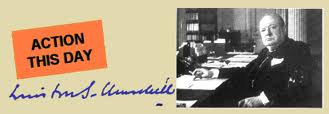Tuesday, October 26, 2010
Churchill and Drucker – executive efficiency and productivity.
Churchill reviewed Drucker's seminal work in 1939 – having lived its tenets.
by StFerdIII

Churchill was a politician who mastered management. So it was evident interest that I came across an article in Business Week about his 1939 review of Peter Drucker's opus on executive leadership. This was a piece of Churchilliana that I was not aware of.
Ties between the two men go way back. In May 1939, Churchill reviewed Drucker's first major book, The End of Economic Man, for The Times Literary Supplement, praising him as "one of those writers to whom almost anything can be forgiven because he not only has a mind of his own, but has a gift of starting other minds along a stimulating line of thought."
But even more than by pen, Churchill and Drucker seem to be connected by deed—at least in the eyes of one Churchill authority. Daniel Myers, chief operating officer of the Churchill Center in Chicago, has in recent years been delivering to business executives a lecture that examines the British leader's actions as "an executive success story." More specifically, Myers details how Churchill illustrated Drucker's eight rules for being an effective executive.
Drucker's book on the eight leadership principles for executives contained tenets that Churchill practiced his entire professional life.
-
What do I want to do?
-
What is right for the enterprise?
-
Action Plans
Drucker's third rule for effectiveness: Develop action plans. The best executives, he said, "think about desired results, probable restraints, future revisions, check-in points." For Myers, at no time have these qualities been put to the test more than when Churchill in May 1940 was pressed by his foreign secretary, Lord Halifax, and others in his cabinet to explore an armistice with Hitler.
Churchill rebuffed them all by laying out clear goals and expectations. "It was idle to think that if we tried to make peace now, we should get better terms from Germany than if we went on and fought it out," Churchill asserted. "Therefore, we shall go on and we shall fight it out, here or elsewhere, and if at last this long island story of ours is to end, let it end only when each of us lies choking in his own blood upon the ground."
-
Take responsibility for the decisions made
-
Take responsibility for communicating those decisions.
The next two things that effective executives do, according to Drucker, are to take responsibility for decisions and take responsibility for communicating. Regarding the former, Myers points to what many believe was Churchill's greatest blunder—his failed attempt during World War I, as Britain's First Lord of the Admiralty, to seize the Dardanelles in the eastern Mediterranean. "He never placed the blame on others," Myers says. As to the latter, Myers says that Churchill worked hard to ensure that he was being fully understood; even his quips were practiced and refined.
6. Focus on opportunities not problems.
"Above all," wrote Drucker, "effective executives treat change as an opportunity rather than a threat." Myers sees Churchill's early years, during which he had published five books and traveled the globe by the age of 26, as a wonderful example of this Drucker principle come to life.
7. Lastly, be productive – including in meetings.
The seventh rule is to run productive meetings—to make sure, as Drucker put it, that they "are work sessions rather than bull sessions." A big key to this, Drucker wrote, is good follow-up. Churchill was a master of this, Myers says, affixing to his most urgent memos bright red labels marked "Action this Day" to help drive his staff to results.
8. We, not I.
Finally, Drucker wrote, effective executives share one more characteristic: They think and say "we" rather than "I." So it was, says Myers, that Churchill refused to be knighted after his party's electoral defeat in 1945. "How can I accept the Order of the Garter," Churchill is said to have asked, "when the people have just given me the Order of the Boot?"
Drucker was a great fan of Churchill, calling his leadership in the 1930s and 40s necessary for Europe's and civilization's survival. In reading the volumes about Churchill's life, his leadership and his variegated activities it is obvious that Churchill practiced the 8 key skills of executive leadership as enunciated by Drucker. That is why in part, he was able to rescue Europe from the predations of a Fascist pagan cult.